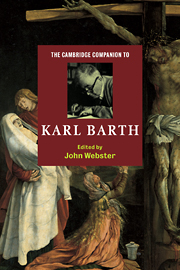Book contents
- Frontmatter
- 1 Introducing Barth
- 2 Theology
- 3 Revelation
- 4 The Bible
- 5 The Trinity
- 6 Grace and being
- 7 Creation and providence
- 8 Karl Barth’s Christology
- 9 Salvation
- 10 The humanity of the human person in Karl Barth’s anthropology
- 11 The mediator of communion
- 12 Christian community, baptism, and Lord’s Supper
- 13 Barth’s trinitarian ethic
- 14 Karl Barth and politics
- 15 Religion and the religions
- 16 Barth and feminism
- 17 Barth, modernity, and postmodernity
- 18 Karl Barth
- Index
14 - Karl Barth and politics
Published online by Cambridge University Press: 28 May 2006
- Frontmatter
- 1 Introducing Barth
- 2 Theology
- 3 Revelation
- 4 The Bible
- 5 The Trinity
- 6 Grace and being
- 7 Creation and providence
- 8 Karl Barth’s Christology
- 9 Salvation
- 10 The humanity of the human person in Karl Barth’s anthropology
- 11 The mediator of communion
- 12 Christian community, baptism, and Lord’s Supper
- 13 Barth’s trinitarian ethic
- 14 Karl Barth and politics
- 15 Religion and the religions
- 16 Barth and feminism
- 17 Barth, modernity, and postmodernity
- 18 Karl Barth
- Index
Summary
In a letter written to Eberhard Bethge in 1968, Karl Barth reflected on how his political commitments did and did not emerge in his theological work. Noting that attention to these was not always prominent, Barth still referred to 'the direction I silently presupposed or only incidentally stressed: ethics - co-humanity - servant church - discipleship - socialism - peace movement - and, hand in hand with all that, politics'. In this chapter, I describe and develop some of the themes Barth mentioned. I will not make a case for the full coherence of these themes in Barth's mature theology because I am not sure that there is an account of this sort, i.e., of Barth's full-fledged and finished 'political ethics'. But my discussion will include a portrayal and an alignment of Barth's political ideas that display both how they might make sense together, and how they might yet exist in conflict or tension. Maybe that is enough to introduce and make clearer the 'direction' of which Barth speaks.
My study points out how Barth (1) affirmed both Christian political responsibility and its theologically required independence from political ideologies and ‘natural law’ approaches as such. Responsibility without independence leaves Christians captive to the ideologies and approaches, and hence unable politically to witness in freedom to God’s sovereign grace. In his understanding of the political order, Barth (2) often focused on the divinely ordained role of the state in protecting citizens from one another and guaranteeing the freedom of the church to preach the gospel. These safeguards are founded on the rule of law backed by threat of coercion.
- Type
- Chapter
- Information
- The Cambridge Companion to Karl Barth , pp. 228 - 242Publisher: Cambridge University PressPrint publication year: 2000
- 5
- Cited by

